Every Cloud
Notes from London, March 2025
The year before I moved to Uzbekistan, Fulbright hosted an English summer camp. Students came from all over the country to spend a month in the ancient silk road city of Samarkand, where they practiced their English and participated in good ol’fashioned American pasttimes such as roasting marshmallows and tye-dying shirts.
It was the latter that incited controversy, when a photo of a particularly rainbow dye job was uploaded to the Uzbek Garden (a Deux Moi-esque tabloid). The American government is pushing gay ideas on our children, was the general sentiment.
This is referred to by Fulbrighters as the Samarcamp incident.1
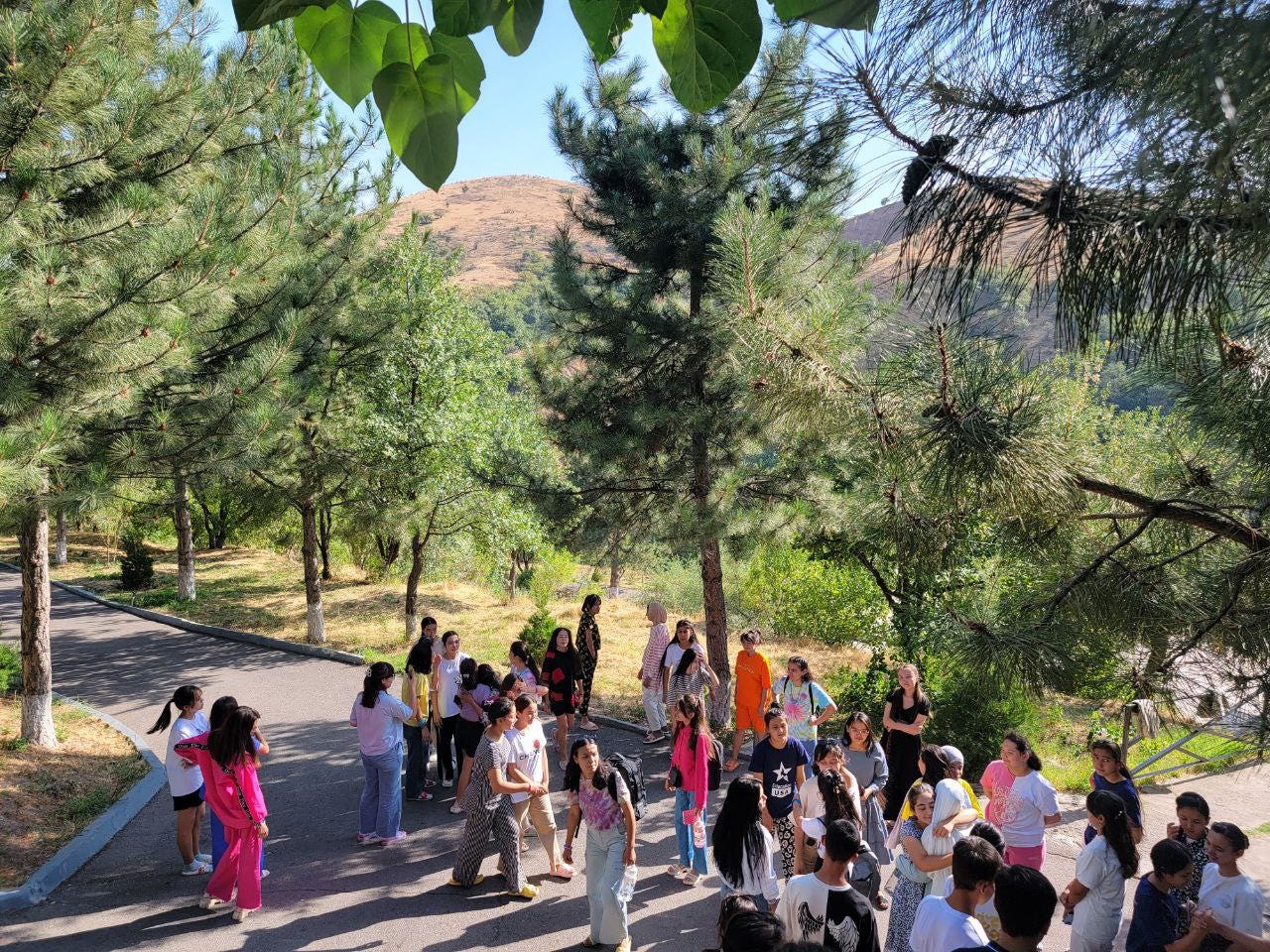
I’m currently staying with a Tajik friend in London who is writing her dissertation on, among other things, the failures of foreign “assistance” in Central Asia. She’s not short on material—it seems that people from halfway around the world love to come and muck about wherever they’re woefully uninformed. These pilgrims, expats, and assorted businesspeople range from bumblingly well-intentioned (see: Samarcamp) to malicious.
There is a novel, written under a pseudonym and passed furtively around in a very niche circle, entitled “The Cynical Expat’s Guide to Provoking Street Revolutions in Central Asia”. It is set in a fictional -stan country—an amalgamation of all of the worst elements of the region—and follows the misadventures of an unlikeable Westerner. Smug, corrupt, and insulated, he blackmails his own NGO, uses “women’s empowerment” grants as leverage to sleep with his staff, and endlessly criticizes everyone around him.
The book is sardonic, offensive, and unfortunately well-written by someone with a deep knowledge and hatred of the world of power and politics in Central Asia. I wouldn’t recommend the book to anyone other than the people who have had it handed to them in person—for any readers outside of the region, I think it’s an incredibly rude portrayal. I’m only bringing it up because I want to stress that the oscillation of expats between incompetence and exploitation in Uzbekistan is so prevalent that it’s become a bit of a running joke.
Also because I want to quote the book later in this letter, and I think it’ll be really confusing if you don’t understand where it’s from.
When Lorel Donaghey was assigned to the new Peace Corps program in Uzbekistan, the first thing she did was crack open an atlas. "I'd never heard of it, but it sounded incredibly exotic," Donaghey said… “All I could imagine was Genghis Khan riding across the plains chopping off heads, caravans on the old Silk Road and cool guys wearing turbans."
"Uzbek Posting Turns into Nightmare”, Deseret, 1995
Around half a year ago, pre-Trump inauguration2, I posted a video about being in the room when Samantha Powers, the director of USAID at the time, was told that Kash Patel was Trump’s nominee for FBI director. It was a tense moment, since Patel has recently put Powers on a list of people that he promised to “destroy” if he was put into a position of power. The video went medium viral because of one of the usual culprits: fighting in the comments.
Side-stepping the point of the video, as comments often do, one side condemned USAID and Powers because of the organization’s various failures while mucking about overseas (see: “democracy programs” in small, natural resource-rich countries). The other side suggested that Powers was really doing the best that she could from within the organization (see: massively reducing global lead poisoning).
My friend in London believes that the one potential silver lining of the current administration in the U.S. is that it’ll eliminate the question of whether American interference is helpful or hurtful: “Trump will pull America away from the rest of the world”, she says, “and isolate your country so aggressively that Central Asia will get to experience a period without American interference.”
Another friend, a professor at a university in Tashkent, complains to me about one of the classes in her America-based graduate program.
“It’s supposed to be an “international” education class, but it’s so America-centric”, she says. “They give you all of these ~ethical dilemmas~ and you’re supposed to discuss how you would address them. Like, how would you deal with a Muslim student who asks for special religious permissions? or, What would you do if a kid comes to you and says he’s nervous to come out as gay?”
We laugh, imagining either of these scenarios through the lens of my friend’s classroom: 98% Muslim, in a country where it’s illegal for men to have sex with each other.
Her American compatriots would advise her to practice acceptance and support at all junctures, but my friend takes a different tack to these ethical dilemmas. She calls it her “Sex, Drugs, and Rock-and-Roll” policy: think of how your response to any given scenario could escalate to the worst possible Uzbek headline. Encourage a student to get a divorce? FOREIGN TEACHER DESTROYS FAMILY VALUES. Push a talented student to apply for international scholarships? That’s TALENTED YOUNG STUDENTS LEAVE THE COUNTRY IN DROVES, BRAIN DRAIN CAUSES COLLAPSE OF UZBEKISTAN.
I think this strategy is why my friend has been a successful teacher in Central Asia for so long.3
It’s the same argument that a different friend used on me last year when a group of teenage boys followed us through a street late at night, yelling slurs at one of the members of our group4 and lobbing pebbles at us when we ignored them.
“You just CAN’T throw rocks back at them”, she scolded. “Think of the headlines”.5
By a crazy stroke of luck, I run into my long-time internet friend Hank Green at a museum in London.6 When we meet up later that day he asks me about my plans for the future, a very reasonable question for which I do not have a very reasonable answer.
Until recently, I wanted to be an ambassador—the kind of ambition that I wouldn’t say out loud frequently, for fear of jinxing it by cementing into the real world just how unlikely it was.
Then I met a handful of ambassadors, and realized that it’s less of a job that you work towards and more of a fun prize that world leaders hand out to their friends.
The current U.S. ambassador to Uzbekistan, a friendly man who enjoys hosting parties, used to listen intently as the other Fulbrighters and I told him about the history of the country or what it was like to live outside of the capital, Tashkent. Really? he would say, that’s so interesting!7
It’s not necessarily his fault—governments often don’t WANT their representatives to know much about the countries that they’re assigned to, out of fear that they’ll become too deeply involved or get corrupted.
I was starstruck when I met the US ambassador to Russia at an embassy in Moscow in 2018, and crushed when he left the room during my presentation—right after I started my segment in Russian. A career ambassador, with previous stints in China and Singapore, at the time I assumed he was simply too busy to stick around.
I later reassessed this assumption when I learned that he received negative media attention after boasting about his fluency in both Mandarin Chinese and Taiwanese Hokkien and saying, when prompted on the Colbert Report to say something in Chinese, delivered a confusingly structured phrase that translated roughly as
“I really want you to do my vice-America president!”
This is, of course, still miles better than his successor who evidently brought ZERO subject matter experts to the Trump-Putin meeting on August 12, refused to use an official notetaker, and misinterpreted Putin’s demand for a partial ceasefire as an offer for “peaceful withdrawal” from Ukraine.
Hank Green, when I see him, has been prepping for an appearance on a British quiz show, the kind that brings on a bunch of comedians to banter their way through trivia questions. Being funny on the spot is difficult enough already, but Hank worries that because of his career as the premier Internet Science Guy everyone will also expect him to be an expert on everything.
Of course, purely by admitting he’s NOT an expert on everything he’s already executing more diplomatic skill than the last 200 years of US foreign policy. If he ever wants to step away from YouTube, he could probably run circles around the Hill armed solely with self-awareness and a whiteboard.
“This is where the US government sends its imbeciles. Except for the young first-year foreign service officers, I think this place is a punishment posting for the State Department’s biggest fuck-ups and morons.”
“And NGOs? What sort of people do they send here?” asked Johnny with a grin.
“Thieves and perverts. And, also, people like me.”
- pg 195, The Cynical Expat’s Guide to Provoking Street Revolutions in Central Asia
The day after I leave London, I invite a man that I meet in my hostel—tall, handsome, Irish—out to dinner. The weather outside is colder than we anticipated, and rather than go back inside and layer up we sprint all of the way to the restaurant and arrive laughing, high on adrenaline.
It’s going quite well, until it takes an absolutely devastating turn.
“I’ve really been wanting to get into social media, start posting about my travels,” says the man. “I think people would really love to see what I get up to.”
I wince internally, and probably a bit externally as well.
My premature distaste is fueled by dual emotions about my own social media presence (which I have not told the man about): one; a general discomfort about existing on social media whatsoever, and two; a general holier than thou-ness about what I post. I’m careful not to show anyone’s face or personal identifiers without explicit permission. I also feel very strange asking for explicit permission, so often I don’t show anyone in my videos at all. Uzbekistan is so empty, was a comment that I used to get often. There’s no one there.
I think back to a tiktok that one of my followers recently tagged me in. This made me think of you, they commented. The video opened with gorgeous high def footage of mountains, and some prolonged shots of elderly people and children in a rural village staring uncomfortably at the camera. “Follow me”, said the British man in the voiceover, “as I attend a bloodthirsty match of goat polo, negotiate a border dispute, and explore the delicious national cuisine of Kyrgyzstan.”
That dickwad didn’t negotiate a border dispute, I think bitterly, rubbing the scar on my shoulder that I got from a goat polo match.
I turn my attention back to my dinner date. “Oh, yeah?” I say. “What kind of content?”
“Just the stuff that I get up to while I’m traveling. I always find my way into these crazy situations. like, Once I was trying to find weed in REDACTED [Conservative Muslim Country], and this guy took me back to his place to smoke. And while he was there he told me had the good stuff and asked me if I wanted to try. Opium, he was talking about opium. It’s so common there, so many people are addicted to opium. I would never do that stuff, obviously. It’s so dangerous. But this guy was offering it to me within the first hour of meeting me. Shit like that happens to me all the time, and people love to watch that kind of thing. It’s so raw, so real.”
“Sure”, I say. “But isn’t opium illegal in REDACTED? Do you really think he’d let you film him doing and selling an illegal drug?”
“Yeah,” he said.
Walking back through the snow towards my hostel, fingers numb from the cold, I think about the message that I got from one of my former students after publishing my most recent Baby Steppes.
She didn’t like it. It was one of my more complicated articles, and while I had felt that it wasn’t inherently a negative read of Uzbekistan, my student disagreed. She was disappointed—disappointed in the takeaways that I had from her country, and disappointed that I decided to publish it.8
This criticism came at an unfortunate time: I was in a state of strange flux between my DC job and grad school and, as often happens when I have too much unstructured time on my hands, the dip in my own morale started manifesting as a critical lens towards the world.
Nothing, and no one, was safe:
My former colleagues were either ill-informed and too outspoken, or well-informed and not outspoken enough. The state of politics was pathetic, almost embarrassing to talk about seriously. Foreigners in Central Asia were naïve, or evil, or both. My friends in DC, the majority of whom had been fired from their government academia jobs and were starting to put themselves through the mortifying ordeal of a prolonged job search, were pitiable. My followers, who occasionally flooded my comments to ask extremely google-able questions about Uzbekistan, were frustrating. The bios of other incoming students to my scholarship felt tinny, insincere. The travel influencers were insufferable, exoticizing and exaggerating their experiences for views.
And, of course, me: less educated and less tactful than my colleagues at the Wilson Center, but undeniably louder, with a larger individual platform. Equally as unemployed as my friends. Am I really any better than the influencers just because I have a smaller audience and I don’t show anyone’s faces? Or maybe I’ve done something even worse than them, something more insidious, by digging deeper and intruding further into a country that wasn’t my own. A blunt object swung into a delicate web of thousands of years of culture.
I am excited, and somewhat relieved, for my upcoming move to China—not just because I am fairly certain that it’ll break me out of this malaise, but because if it doesn’t, at least the scale will put me back in proportion. Uzbekistan is small enough that one loud American with a camera feels like a hazard. In one of the largest, most powerful countries in the world, my newfound pessimism won’t even register.
In China I’ll only ever be punching up.
AUTHOR’S NOTE
Hi Baby Steppers! Sorry (as always) for the hiatus, but extra sorry for this one since it’s been nearly half a year. I took the time in between the end of my internship in D.C. and the start of my grad program in Beijing to do a little bit of solo travel—being busy is always terrible for my social media presence, but it was ESPECIALLY bad this time.
I’m back home and have some time on my hands to sort out my notes—what you read above was, as you probably guessed, a letter that I wrote the majority of in March while I was in London. Thanks for sticking around.
Perhaps the photo wasn’t particularly good, or the rainbow wasn’t particularly ROYGBIV enough, because the next cohort of Fulbrighters (mine) was allowed to host another summer camp the following year.
. . . it’s only been half a year?
And why I could only hack it for 2 years.
They also yelled every other word in their limited English vocabulary at us. It was funny, in a dark sense, to hear the n-word sandwiched in between “Hello, Teacher!”
This story, by the way, is not meant as a condemnation of Uzbekistan—in fact, if I had ever brought this incident up with an Uzbek person (which I would never do) they would probably be mortified. I would mostly attribute the entire incident to the fact that teenage boys are frequently stupid idiots all over the world.
Although in retrospect, if there’s anywhere in the world I’m going to randomly run into Hank Green I suppose a museum is probably the most likely.
This isn’t to disparage the ambassador, who is very kind and has a Very Impressive Background. As do a great many people in government, my friends who were all recently fired from their D.C. jobs included.
I think one of the comments that I got when I discussed the feedback on my Substack notes really helped contextualize my student’s feelings for me, so I’m just going to add it here.
”I can understand her perspective even though I disagree with it. My family is from India, and beyond simple racism, the world just tends to value stories written with a more critical lens when it comes to 3rd world nations. So, people from such nations, including myself at times, can be far more sensitive to even mild criticism since it can so easily be spun out of control due to the lack of positive reporting to balance it out.”



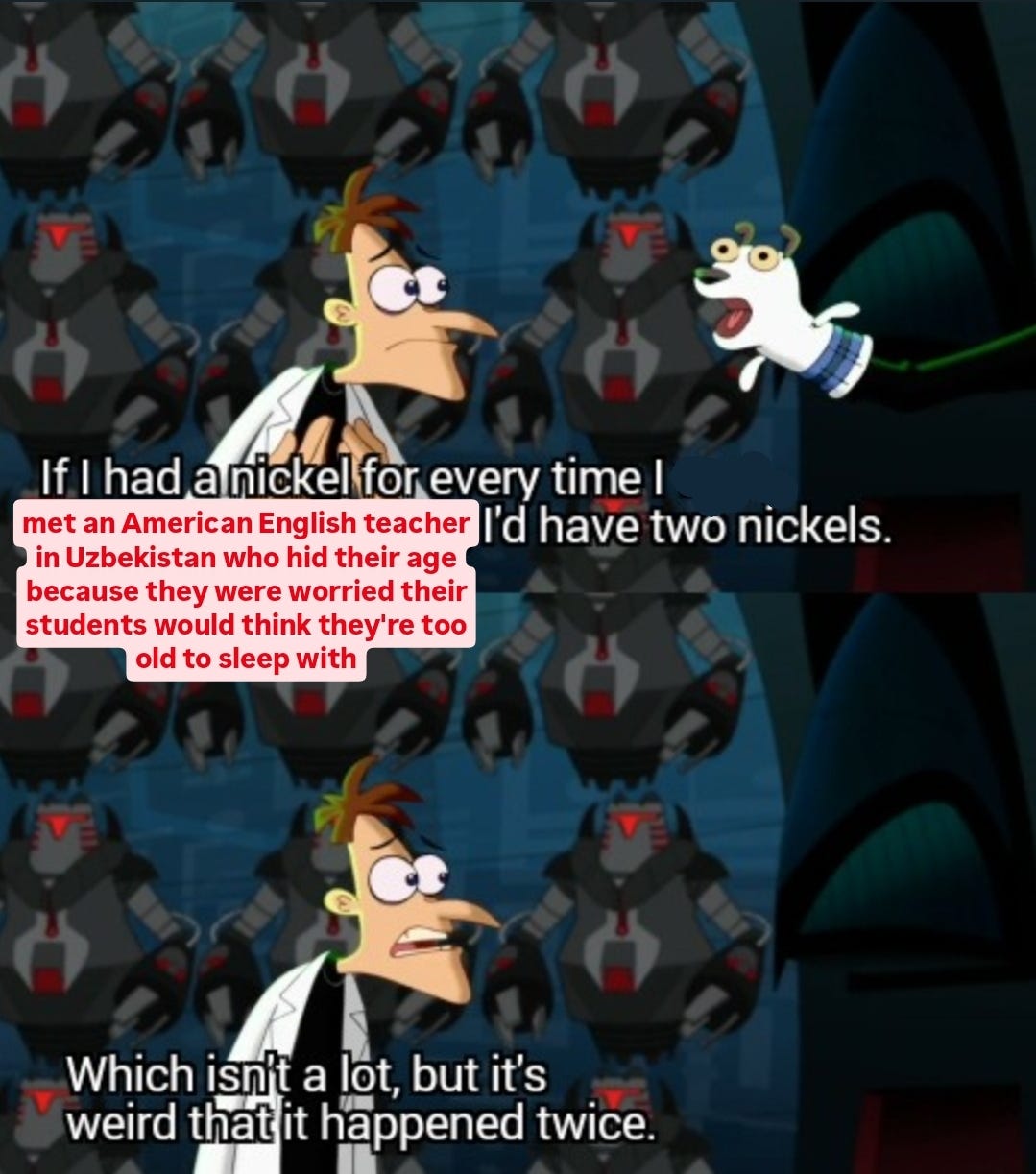

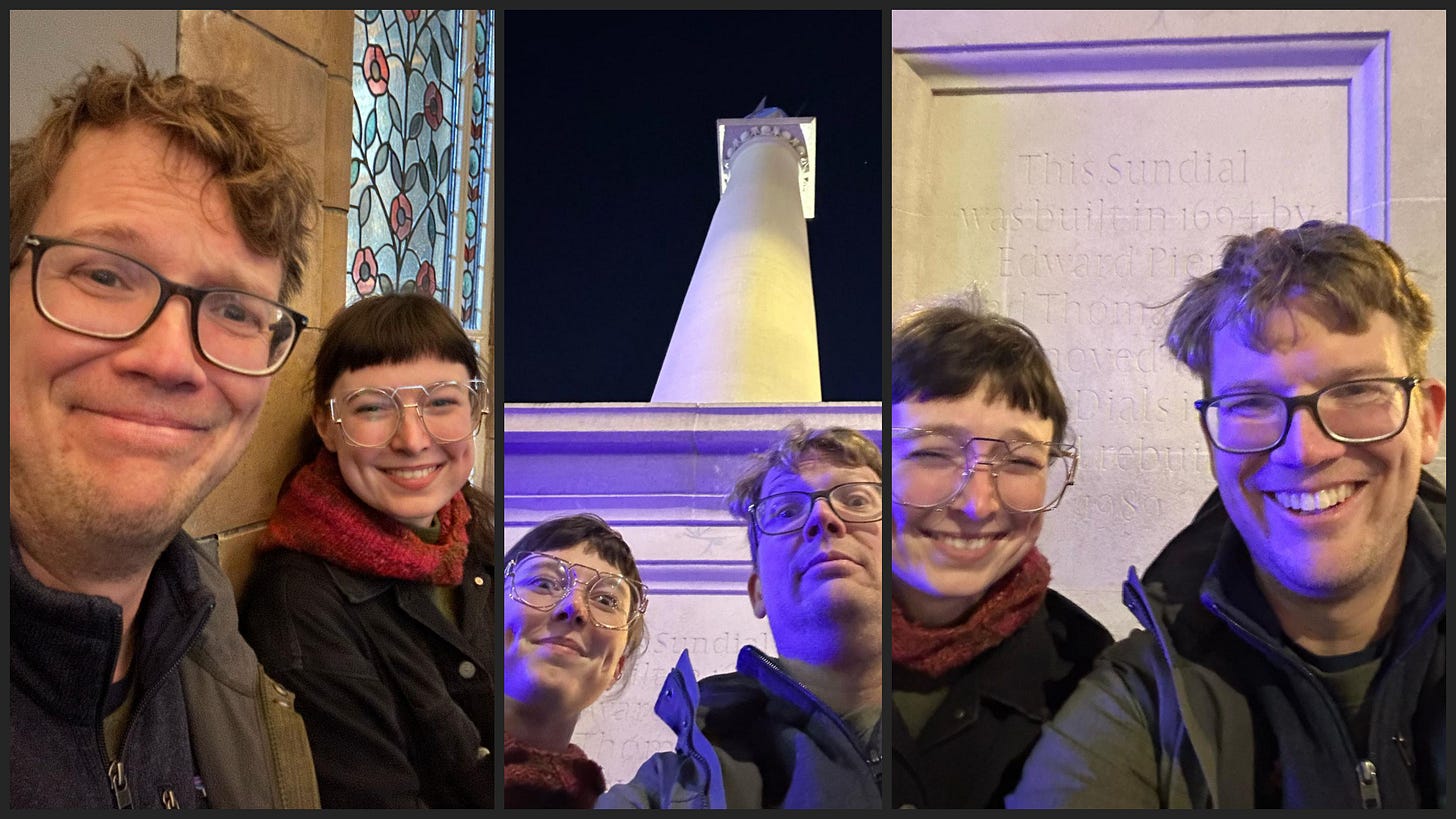
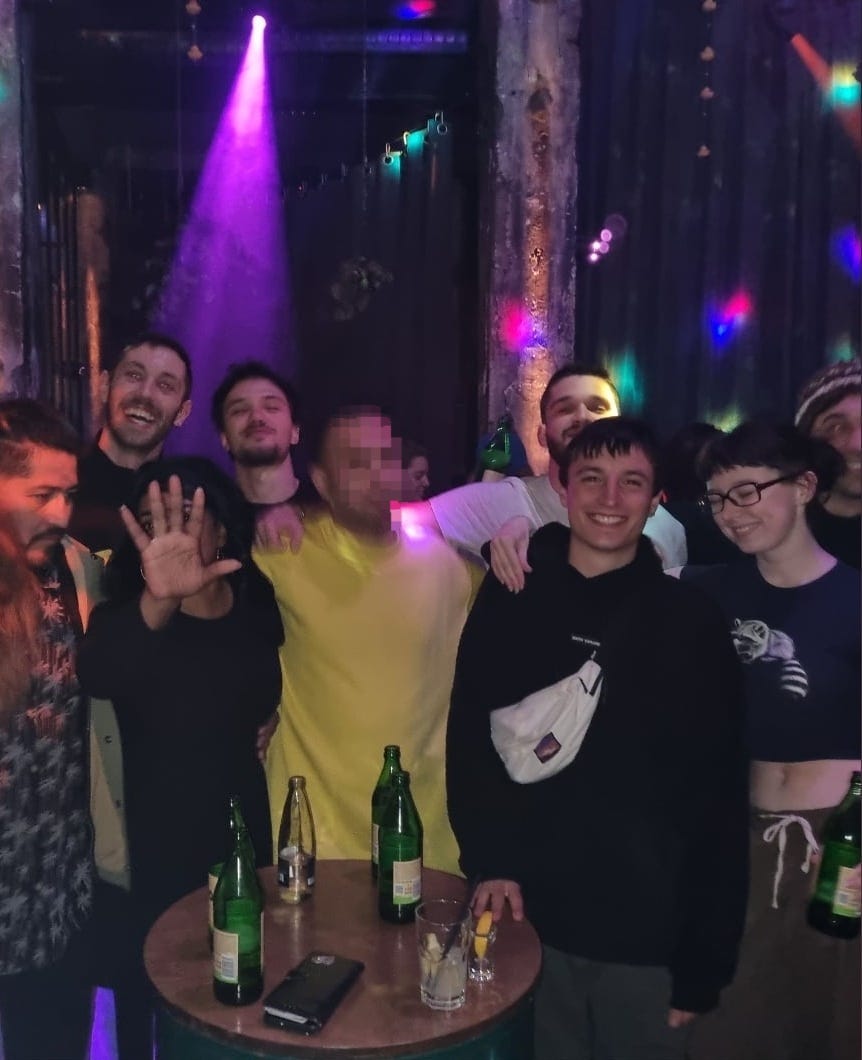

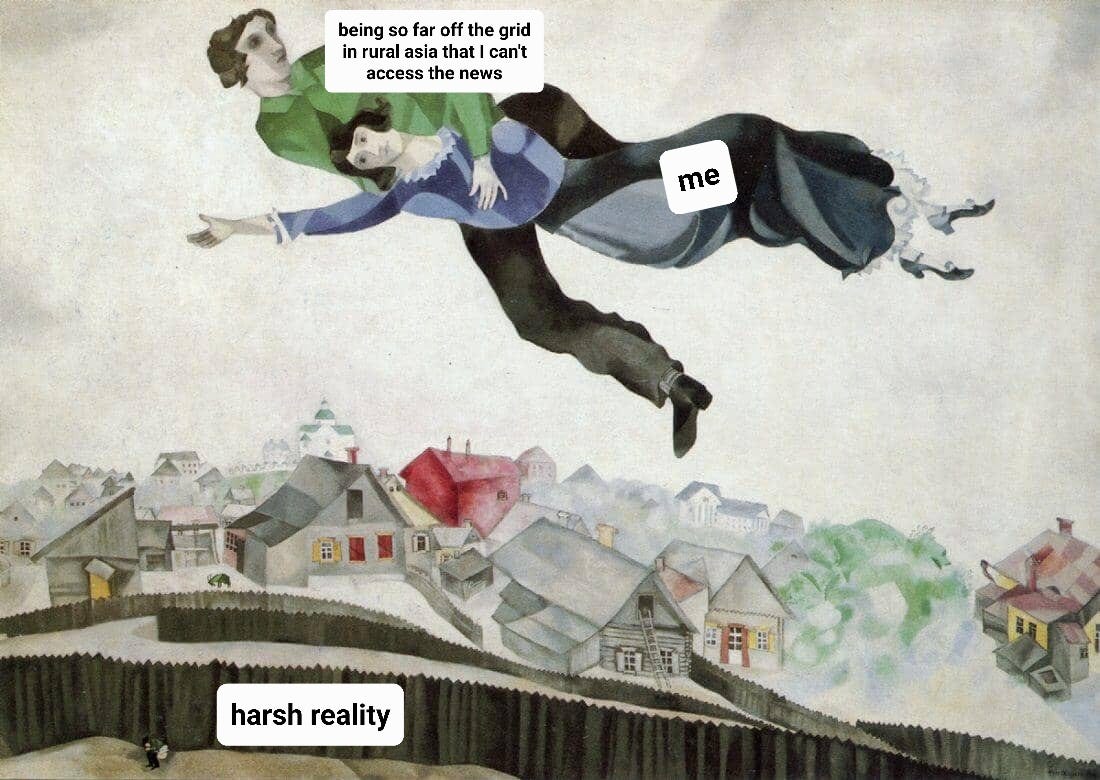
99% of people in California, and anyone over 45, can tell the difference between hippie tie-dye and rainbow coalition. It must be like the confusion that central Asians feel when we lump together disparate turkic customs, which are as different as The Dead and Act Up. Good luck finding your way through all this in China. (I found you years ago, when you found the source of the fake UFO heiroglyphic and have been following since.)
everything you share makes me feel An Emotion As Yet Undescribed. big love to you ottilie